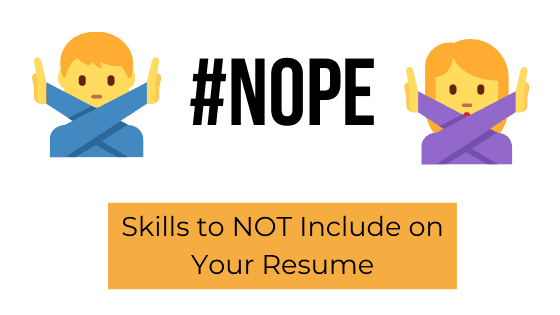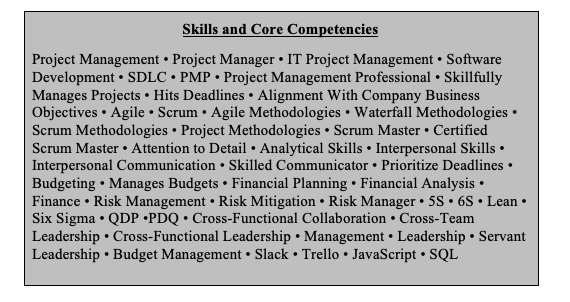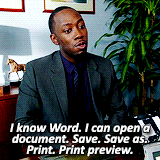Ditch ‘Em! Skills to Leave Off Your Resume

While you may think they’re impressive, there are definitely some skills not to put on your resume. Learn what they are and why you should leave them off.
By: Matt Dupee | Resume Writer for Let’s Eat, Grandma
You have to have skills to pay the bills. On your resume, that saying is actually literal!
Having a skills section on your resume is important. It’s not just a great mental checklist for recruiters to scan; in the era of Applicant Tracking Systems (ATS), the skills section has evolved into one of the most important sections of your resume.
The inclusion of keywords from the job description on your resume (which are often skills that recruiters search for — see #2 here) may make the difference between being seen by a human and being rejected by a digital “bot”.
Want more job search tips? Sign up for our newsletter!
However, all the hype about ATS isn’t a cause for alarm. Contrary to what some job seekers think, you shouldn’t go putting every skill you can think of on your resume. Whether they’re obvious, obsolete, or irrelevant, some skills are just a waste of space.

Do NOT end up with a skills section like this. There are plenty of skills to leave off your resume.

Do NOT end up with a skills section like this. There are plenty of skills to leave off your resume.
Here are examples of skills to leave off your resume.
Skills You Should NOT Put on Your Resume
1. Obsolete or Unvalued Skills
—Old/unused programming languages. At the rate the tech industry changes, folks who code don’t need to list languages they won’t be using on the job. Unless it’s specifically called for, don’t list old languages like Visual Basic, COBOL, etc. (It may even expose you to ageism.)

General social media knowledge that’s not relevant to the job is not a skill to put on a resume.
—Social Media skills. This might surprise you! Social media is a common “filler” technical skill because people think it can look modern. If you’re not in marketing or performing this as an essential job function, though, it’s actually not a great addition.
The advent of the Social Media Manager role and the ubiquity of social platforms mean that knowing how to use Instagram isn’t impressive or useful as a general skill. (And if you are trying to show these skills for a marketing/social job, you’ll need to list the actual platforms, tools, and methods listed in the job description, not just “Social Media!”)
—Foreign Languages you’re not very proficient in. Remembering some French from high school/college won’t gain you any bonus points with the recruiter. If the job calls for a certain language, you should obviously list it. Other than that, stick to languages you have at least a working proficiency in.
If you can tell the company would appreciate it (say, if they do a lot of business with a certain country even if you won’t be directly interacting with clients from that country), then you can consider listing a language you have only very little knowledge of. In virtually all other cases, leave it off.
—Data Entry. If you’re working with data extensively or in an administrative/clerical position, then this skill can be relevant. But don’t use it as a “filler” skill if it’s not related to the job. If it’s not a primary job function, this isn’t an impressive skill to highlight.
2. Obvious skills
—Microsoft Word. Unless you need to show advanced proficiency in Word, it’s pretty much assumed you can use it well enough for the majority of jobs. (Same goes for Excel — if you need to show that you know advanced Excel functions, list those functions.)
—Email proficiency. Well… yeah! In 2020, you better know how to send a dang email. This is 100% assumed and 0% impressive on a resume.
—Typing speed. Unless you have an unbelievably high WPM typing score and you’re in a fast-paced, clerical position where this would set you apart, don’t include typing skills. It’s assumed you can type fast enough to get the job done.
—Soft skills that are “too soft”
Soft skills are crucially important, and many job postings do list soft skills under desired qualifications. We have all seen requests for candidates that have excellent written and verbal communication skills, the ability to multi-task, and the ability to work well with others. While it is fine to list a few soft skills if they’re particularly relevant and you’re particularly proud of them, don’t overdo it because…
- They’re not commonly searched in ATS.
- They’re usually covered or implied in your professional experience section, summary, and/or cover letter.
- Many of them are “too soft” – they’re implied or expected for any professional (i.e., “determination,” “punctuality,” “work ethic”) These are skills to leave off a resume because they’re so expected that they won’t add value to your professional profile.
3. Irrelevant Skills
It is also important to leave off irrelevant skills, including athletic skills, personal traits, or hobbies and interests. While you may think these show personality or “culture fit” (both important qualities in an applicant), those qualities are better expressed elsewhere. You can convey those in your cover letter and LinkedIn – where you have more space to explain why they’re relevant to your professional qualifications – as well as your networking efforts and, of course, your interview.
A recruiter doing their initial scan won’t pick your resume over another because you just say that you’re good at hockey! These are skills to not put on your resume because they can be a bit too personal. They don’t add value, and they take up precious real estate from accomplishments that will.
There are Exceptions
While you should use the above guidelines for skills to leave off your resume, there are some exceptions to the rule. I once wrote a resume for a pharmaceutical sales representative; that’s a field where athletic accomplishments can be looked upon favorably because they demonstrate energy and a sense of competition.
This client was an avid Crossfitter. During one of our calls, we discussed Crossfit and I discovered she had an impressive deadlift. Since I had space, I listed her max deadlift at the bottom of her resume.
She interviewed for her target role and was quickly hired. When she reached out to let me know she got the job, she mentioned that the person hiring her was also a Crossfitter and loved that she included this on her resume. This is certainly a unique story, but also shows that everything depends on the situation — and a little personality goes a long way!
To compete in today’s job market, you may need to detach yourself from certain things on your resume, including your impressive typing skills and the trophies you won playing basketball in high school. To write a great skills section, focus on skills listed in job postings, adjust your resume for each job to better target the ATS, and use soft skills sparingly. Don’t waste space on anything that’s implied, obvious, or unhelpful for hiring!
Want more job search tips sent straight to your inbox? Sign up for our newsletter here:
Better Resume.
Satisfying Career.
Happier You.

